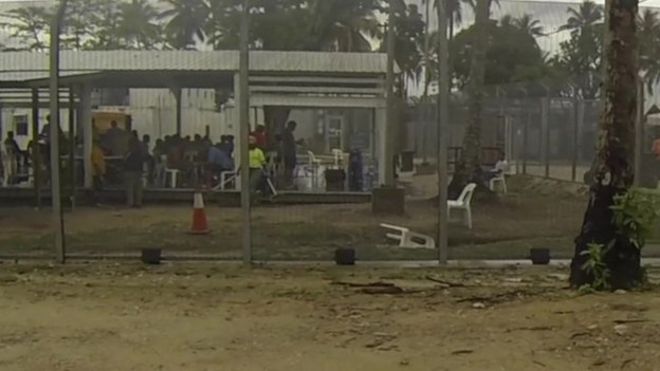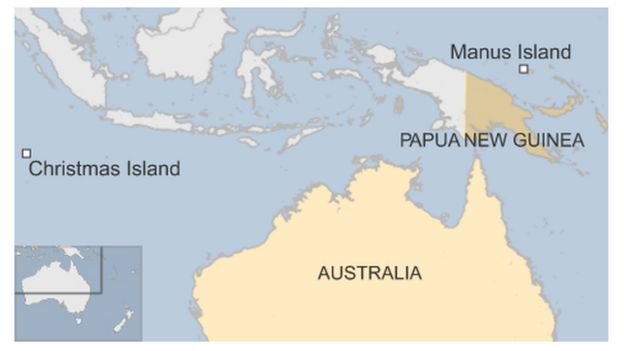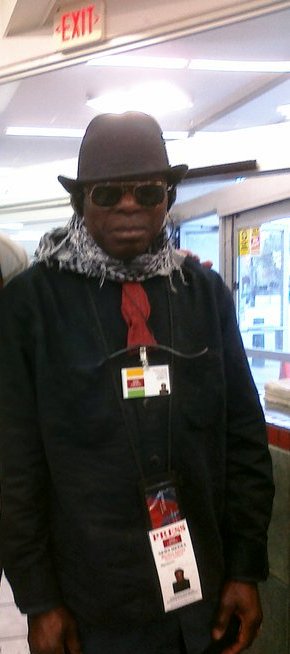- 4 minutes ago
- From the section Australia

Papua New Guinea is to close a detention centre used by Australia for asylum seekers, Prime Minister Peter O'Neill has announced.
His statement followed a Supreme Court ruling on Tuesday that detaining people in such a camp was unconstitutional.Australia sends asylum seekers to the Manus Island detention centre under its offshore processing policy.
Earlier on Wednesday, Australia's PM said the asylum seekers were the responsibility of Papua New Guinea.
"Naturally we are working, we'll work with them, support them," Malcolm Turnbull said, "but it's a matter that we've got to go through the judgment, got to go through the implications, what the options are for the PNG government.
"So, I can't provide a definitive road map from here right today," he added.
Currently about 850 men are held on the island, about half of whom have been judged genuine refugees.
Manus Island: a controversial 'solution'
- The camp first opened in 2001 under Australian Prime Minister John Howard.
- It was formally closed in 2008, but reopened in 2012 when a spike in asylum seeker arrivals became a major political issue for the Labor government.
- In 2013 Australia agreed to give Papua New Guinea A$400m ($309m; £212m) in aid in exchange for housing a camp and to resettle genuine refugees.
- Deadly riots broke out in February 2014 when local residents entered the facility. In January 2015 some detainees barricaded themselves inside their compound and went on hunger strike.
- Private security contractor Broadspectrum, formerly Transfield Services, currently runs the camp.
- Australia's government says its refugee policy has led to a sharp drop in the number of migrant boats.
- UN agencies and rights groups have criticised conditions at the camp and say Australia is shirking its responsibilities towards refugees and migrants.
Australia's controversial asylum policy
'Out of step'
Mr O'Neill said that, following the ruling, "Papua New Guinea will immediately ask the Australian government to make alternative arrangements for the asylum-seekers currently held at the Regional Processing Centre".He said that those "deemed legitimate refugees" would be invited to live in Papua New Guinea "if they want to be part of our society and make a contribution to our community".
"It is clear," he added, "that several of these refugees do not want to settle in Papua New Guinea".
Mr O'Neill's announcement leaves Australia with a headache - what to do with the asylum seekers, says the BBC's Jon Donnison in Sydney.
One option is for Australia to shift them to its offshore detention centres in Nauru and on Christmas Island, he adds.

The president of the Australian Human Rights Commission, Gillian Triggs said the court decision showed Australia's immigration policies were "increasingly out of step with international norms".
'Illegal'
Five judges on Papua New Guinea's Supreme Court's bench ruled that the Manus Island camp breached section 42 of the constitution, which guarantees personal liberty.The court said "all steps" should be taken to end the "illegal" detention.
Papua New Guinea's constitution guarantees personal liberty for all people, except in defined circumstances relating to crime, illegal immigration and quarantine.
In 2014, Papua New Guinea's government amended section 42 of the constitution to add a paragraph that allowed for "holding a foreign national under arrangements made by Papua New Guinea with another country".
But the Supreme Court ruled this amendment was unconstitutional, as it did not meet a requirement to respect "the rights and dignity of mankind".
Are you affected by issues in this story? Have you stayed at the centre or are you there now? Let us know about your experiences. Email haveyoursay@bbc.co.uk with your stories.
Please include a contact number if you are willing to speak to a BBC journalist. You can also contact us in the following ways:
- WhatsApp: +44 7525 900971
- Send pictures/video to yourpics@bbc.co.uk
- Upload your pictures / video here
- Tweet: @BBC_HaveYourSay
- Send an SMS or MMS to 61124 or +44 7624 800 100
Or use the form below

No comments:
Post a Comment